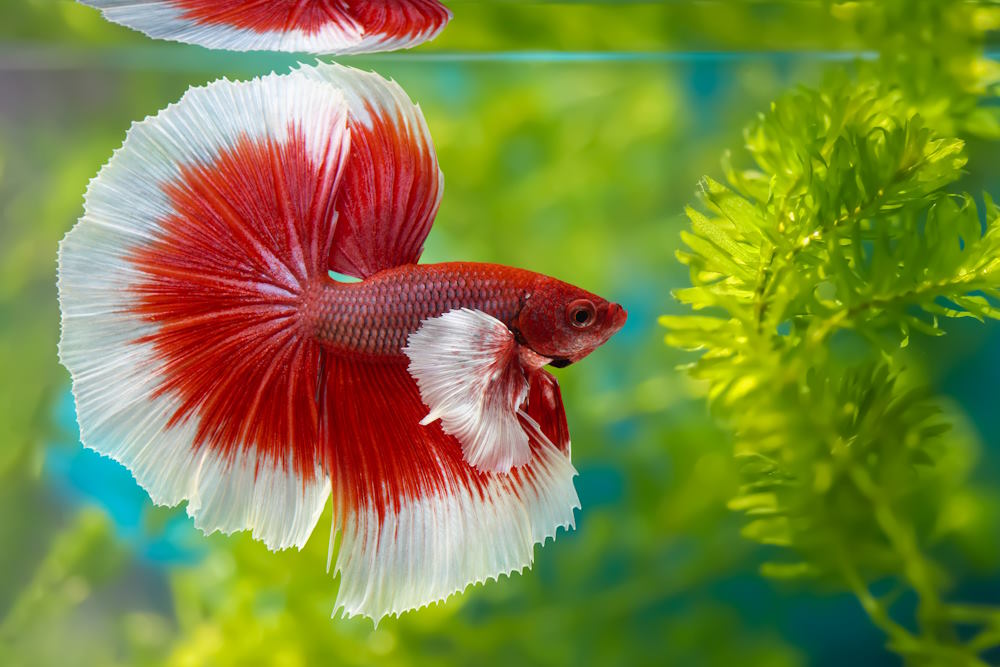All About Betta Fish: Recognizing Their Distinct Demands, Habits, and the Best Practices for Ideal Care
Comprehending the one-of-a-kind demands and behaviors of Betta fish is necessary for any kind of aquarist looking to provide optimal care. betta fish. As we check out these aspects even more, the ramifications for both newbie and seasoned fish caretakers come to be significantly evident, raising questions about exactly how ideal to suit these impressive fish in our homes.
Betta Fish Overview
Although frequently admired for their vibrant colors and flowing fins, Betta fish, scientifically known as Betta splendens, are complex creatures that call for details like prosper. Originating from Southeast Asia, these freshwater fish are understood for their territorial nature and distinct behaviors. Betta fish display sexual dimorphism, with males presenting extra dazzling shades and longer fins than females.
Their aggressive propensities, specifically amongst men, require cautious consideration when real estate them. Bettas are usually maintained in single-specimen storage tanks to stop territorial disagreements. They can exist side-by-side quietly with certain suitable species in bigger neighborhood containers, supplied the environment fulfills their requirements.

To guarantee ideal treatment, aquarists have to comprehend their one-of-a-kind behavior traits, dietary requirements, and habitat demands. betta fish. With proper interest, Betta fish can display their dynamic characters and grow in a well-maintained aquarium setting
Natural Habitat and Atmosphere
Betta fish thrive in a diverse series of natural habitats, primarily found in the superficial waters of Southeast Asia, consisting of rice paddies, swamps, and slow-moving streams. These settings are defined by warm temperatures, generally between 75 ° F and 82 ° F(24 ° C and 28 ° C ), and a pH degree varying from 6.5 to 7.5, which is optimal for their health and wellness.
In their natural surroundings, Betta fish are accustomed to thick vegetation, offering both sanctuary and reproducing premises. The visibility of plants such as drifting water lilies and thick turfs not only provides defense from killers however additionally adds to the oxygenation of the water, which is necessary for their breathing needs. In addition, these atmospheres frequently have areas of still water, permitting Betta fish to display their all-natural habits such as bubble nesting.
Understanding the all-natural habitat of Betta fish is critical for aquarium enthusiasts. Replicating these problems-- with water temperature, pH equilibrium, and the inclusion of online plants-- can view it now considerably boost the general wellness and longevity of these fascinating fish, ensuring they prosper in a home aquarium setting.
Social Actions and Interactions
Recognizing the social habits and communications of Betta fish is vital for successful aquarium monitoring. Betta fish, or Siamese battling fish, are recognized for their unique behavioral attributes, characterized mostly by territoriality and aggression. Males, particularly, show highly aggressive behaviors towards each other, causing the notorious track record of Betta fish as competitors. In a confined space, 2 males can involve in fierce battles, typically resulting in injury or death.
Alternatively, female Bettas show much less aggressive actions and can coexist in teams, known as sororities, if presented properly. It is critical to check their communications carefully, as hierarchy and supremacy can lead to disputes. Recognizing the dynamics within a Betta community is vital; developing concealing areas and making sure adequate area can reduce aggression.
On top of that, Betta fish might likewise show curiosity and social behaviors in the direction of other species. While they can exist side-by-side with particular non-aggressive storage tank companions, it is vital to choose suitable types to avoid stress and aggressiveness. Generally, acknowledging these social communications is crucial to promoting a harmonious aquarium environment for Betta fish.
Vital Care Standards
Providing appropriate treatment recommended you read for Betta fish is essential to their wellness and wellness. Routine water modifications-- roughly 25% once a week-- assistance keep water quality.
Betta fish need an ideal tank size; a minimum of 5 gallons is suggested to provide appropriate room for swimming and hiding. Include designs and plants to produce a revitalizing environment, however stay clear of sharp things that can harm their fragile fins.

Finally, guarantee the tank is geared up with a filter to keep the water tidy, however utilize a gentle filter to avoid strong currents that can worry the fish. By complying with these vital care guidelines, proprietors can advertise a healthy and dynamic Betta fish.
Common Health Issues and Solutions
In the care of Betta fish, understanding of typical wellness problems this contact form is necessary for maintaining their health. One common issue is fin rot, frequently caused by inadequate water high quality or bacterial infection. Signs and symptoms include torn or tarnished fins. To treat fin rot, boost water conditions and think about utilizing a broad-spectrum antibiotic.
Another typical ailment is ich, a parasitic infection identified by white areas on the fish's body (betta fish). Therapy includes enhancing water temperature level and adding fish tank salt to the container, as this can assist remove the parasite
Swim bladder condition is additionally often observed, bring about buoyancy problems. This condition might arise from overfeeding or constipation. A fasting duration of 24-48 hours, adhered to by a diet of blanched peas, can supply alleviation.
Lastly, bettas may experience velvet illness, suggested by a gold dust-like look on their skin. Treatment usually calls for medication particularly created for exterior parasites, together with boosted container hygiene.
Normal monitoring of water parameters, preserving a tidy setting, and providing a balanced diet plan are vital safety nets. By attending to these wellness concerns without delay, Betta fish can lead much healthier, extra dynamic lives.
Final Thought
In recap, effective betta fish care requires an understanding of their one-of-a-kind needs and behaviors. Normal tracking of health and wellness and water quality, along with a well balanced diet plan, contributes to the long life and vibrancy of betta fish.